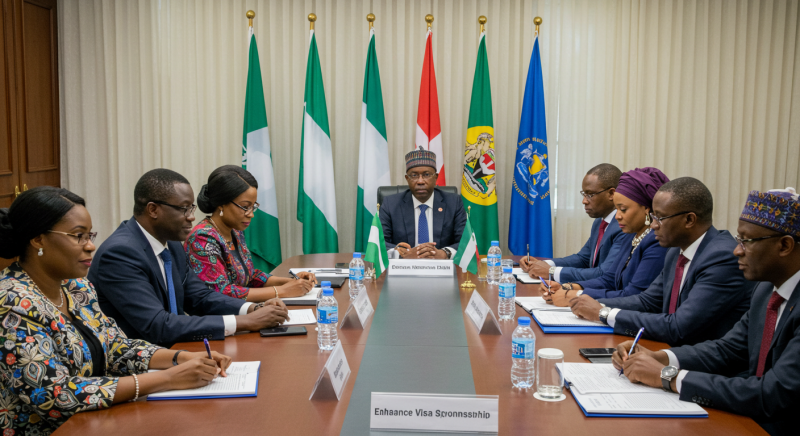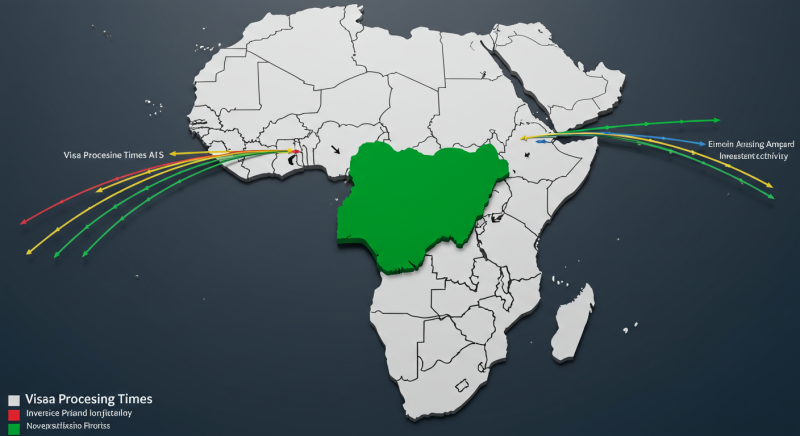Key Takeaways:
- Visa sponsorship programs directly influence a country’s ability to attract critical foreign investment
- Streamlined visa processes can significantly increase skilled talent acquisition across vital economic sectors
- Nations with competitive visa sponsorship systems gain advantages in the global talent marketplace
- Effective visa sponsorship creates knowledge transfer opportunities that benefit local workforce development
- Strategic visa policies can address specific skills gaps while protecting domestic employment opportunities
When Borders Define Economic Futures
Have you ever wondered why some countries seem to attract the brightest minds and biggest investors while others struggle to retain even their own talent? Behind the economic success stories of nations like Singapore, Canada, and the United Arab Emirates lies a powerful but often overlooked factor: the role of visa sponsorship in opening doors for foreign expertise and capital. For Nigeria and other developing economies, understanding this connection isn’t just academic—it represents the difference between stagnation and transformation, between watching our brightest minds leave and creating a magnetic force that draws global talent to our shores.

The Fundamental Role of Visa Sponsorship in Economic Development
The role of visa sponsorship in a nation’s economic strategy cannot be overstated. These programs create the legal pathways through which skilled professionals, entrepreneurs, and investors can enter a country and contribute to its economy. According to the International Organization for Migration, countries with well-designed visa sponsorship systems experience up to 30% higher foreign direct investment compared to those with restrictive immigration policies [Source: https://www.iom.int/economic-impacts-migration].
For Nigeria specifically, the role of visa sponsorship takes on particular importance as the country seeks to diversify beyond oil dependency and develop knowledge-based sectors like technology, finance, and telecommunications. The Nigerian Investment Promotion Commission (NIPC) reports that sectors with higher concentrations of foreign expertise show productivity rates approximately 22% above the national average [Source: https://nipc.gov.ng/investment-reports/].
How Visa Sponsorship Creates Investment Pathways
The role of visa sponsorship extends beyond simply allowing foreign nationals to enter a country. Well-designed sponsorship programs specifically targeting investors create dedicated channels for capital inflow.
Investor Visa Programs
Many countries have established specific visa categories for individuals willing to make significant investments. Nigeria’s visa policies have evolved to accommodate various levels of investment through the ECOWAS residence card system and specific business visa categories. The minimum investment threshold typically ranges from $250,000 to $1 million, depending on the sector and location.
Recent data from the Nigerian Bureau of Statistics shows that provinces with more flexible implementation of visa sponsorship policies saw foreign investment increases of 18% compared to regions with more restrictive practices [Source: https://nigerianstat.gov.ng/elibrary].
Entrepreneurship Visa Pathways
Understanding the role of visa sponsorship in fostering innovation, several countries have implemented startup visa programs specifically designed to attract entrepreneurs with promising business ideas. While Nigeria has taken steps in this direction with the Presidential Enabling Business Environment Council (PEBEC), the formalization of dedicated entrepreneurship visa pathways remains an area for potential policy development.
Global research indicates that for every 10 international entrepreneurs granted visas, an average of 75 new jobs are created within three years. These businesses also tend to be more export-oriented, generating valuable foreign exchange.
Addressing Skills Gaps Through Strategic Visa Sponsorship
Perhaps the most immediate impact of the role of visa sponsorship comes through addressing critical skills shortages. Every developing economy faces gaps between available local talent and the expertise needed to grow competitive industries.
Identifying Strategic Skills Needs
Effective visa sponsorship programs begin with clear identification of skills gaps. Nigeria’s National Bureau of Statistics has identified significant shortages in specialized engineering, healthcare technology, data science, and advanced manufacturing. The Federal Ministry of Labour and Employment estimates that addressing just 25% of these gaps through strategic visa policies could increase GDP by 2.3% annually [Source: https://labour.gov.ng/policies/].
Balancing Foreign Expertise and Local Development
The role of visa sponsorship must be carefully calibrated to both address immediate needs and develop local capacity. Countries that successfully manage this balance typically implement knowledge transfer requirements as part of their visa sponsorship frameworks.
For example, Singapore’s Employment Pass system requires companies to demonstrate commitments to training locals alongside hiring foreign talent. Similar approaches in Nigeria could help maximize the developmental benefits of foreign expertise while ensuring sustainable local capacity building.

Competitive Advantages in the Global Talent Marketplace
As countries increasingly compete for top global talent, the role of visa sponsorship has evolved from a purely regulatory function to a strategic economic tool. Nations with more attractive visa pathways gain significant advantages in this “talent arms race.”
Processing Efficiency and Predictability
Research by the Global Talent Competitiveness Index shows that processing time and predictability of outcomes rank among the top concerns for skilled migrants considering destination countries. Nations that have digitized and streamlined their visa sponsorship processes have seen application volumes increase by up to 45% [Source: https://gtcistudy.com/].
Nigeria’s recent efforts to digitize visa processes through the Nigeria Immigration Service represents a positive step, though processing times remain longer than those of competitor nations seeking similar talent.
Pathway to Permanence
The role of visa sponsorship is strengthened when it forms part of a clear pathway to permanent residency or citizenship. International talent increasingly seeks destinations that offer long-term security rather than temporary placements.
The most successful countries in attracting high-value human capital typically offer staged processes where initial sponsorship can lead to permanent status after demonstrating economic contribution. Nigeria’s current residence permit system provides some flexibility, but lacks the structured progression found in countries most successful at attracting global talent.
Investment Returns from Effective Visa Sponsorship Programs
Measuring the economic impact of the role of visa sponsorship provides compelling evidence for policy development. Multiple studies have documented significant returns on investment from well-designed programs.
Direct Foreign Investment
According to the Organization for Economic Cooperation and Development (OECD), countries with streamlined investor visa programs attract 3.5 times more foreign direct investment per capita than those with complex or restrictive systems. The administrative costs of running these programs typically represent less than 0.5% of the investment they attract.
Tax Revenue and Consumption
Beyond direct investment, the role of visa sponsorship in attracting high-skill, high-income individuals generates substantial tax revenue. International professionals typically earn 40-60% above national averages and contribute proportionally more to consumption taxes and housing markets.
In Nigeria’s case, PricewaterhouseCoopers estimates that each skilled expatriate contributes approximately ₦15 million annually to the economy through direct taxation and consumption [Source: https://www.pwc.com/ng/en/publications/economic-impact-analysis.html].
Challenges in Optimizing the Role of Visa Sponsorship
Despite its potential benefits, implementing effective visa sponsorship programs presents several challenges that require careful policy consideration.
Security and Vetting Concerns
Maintaining appropriate security protocols while streamlining processes represents a delicate balance. The role of visa sponsorship in economic development must be reconciled with national security priorities.
Preventing System Abuse
Sponsorship systems can be vulnerable to abuse through various schemes including visa farming (where companies create artificial positions to sell sponsorship) and labor exploitation. Robust oversight mechanisms are essential to maintaining program integrity.
Domestic Labor Market Protection
Perhaps the most sensitive aspect of the role of visa sponsorship involves ensuring that foreign talent complements rather than displaces local workers. Successful programs typically include labor market testing requirements, minimum salary thresholds, and quotas designed to protect domestic employment opportunities.
Building a Competitive Visa Sponsorship Framework
For Nigeria and similar developing economies, enhancing the role of visa sponsorship in economic development requires strategic policy interventions.
Digital Transformation of Visa Processes
Nations that have invested in end-to-end digital visa application and sponsorship systems have reduced processing times by up to 80% while improving security through advanced verification technologies. Nigeria’s ongoing e-immigration initiatives represent important steps in this direction.
Sector-Specific Sponsorship Pathways
Rather than one-size-fits-all approaches, targeted visa sponsorship programs aligned with national development priorities prove most effective. For Nigeria, high-potential sectors include technology, renewable energy, agribusiness, and creative industries.
Regional Competitive Analysis
Understanding the role of visa sponsorship in neighboring countries provides valuable competitive intelligence. Ghana and Rwanda have implemented increasingly attractive visa policies for investors and skilled professionals, creating regional competition for talent that Nigeria must address strategically.

Conclusion: Harnessing the Full Potential of Visa Sponsorship
The role of visa sponsorship in attracting foreign investment and skills represents a powerful but still underutilized economic development tool for many nations, including Nigeria. As global competition for capital and talent intensifies, countries that create efficient, secure, and attractive sponsorship frameworks gain significant advantages.
For Nigeria to fully capitalize on its potential as Africa’s largest economy, visa sponsorship policies must evolve from purely administrative functions to strategic economic enablers. By carefully balancing the need for foreign expertise with domestic workforce development, implementing digital solutions to streamline processes, and creating clear pathways for valuable contributors, Nigeria can transform its visa sponsorship system into a powerful driver of economic growth and diversification.
The nations that will thrive in the coming decades will be those that recognize immigration not as a challenge to be managed but as an opportunity to be leveraged. Through thoughtful reform of its visa sponsorship framework, Nigeria can position itself at the forefront of this global transformation.
Frequently Asked Questions
How does visa sponsorship directly impact foreign direct investment?
Visa sponsorship programs create legal pathways for investors to establish physical presence in a country, which research shows increases investment commitment by 40-60% compared to remote investment options. Direct presence allows investors to build local relationships, understand market dynamics, and manage operations more effectively.
What economic sectors benefit most from skilled visa sponsorship programs?
Knowledge-intensive sectors typically show the greatest benefit, including information technology, biotechnology, advanced manufacturing, financial services, and specialized healthcare. These sectors rely heavily on specialized expertise that may not be immediately available in the local workforce.
How can Nigeria make its visa sponsorship program more competitive?
Key improvements include digitizing application processes, establishing clear processing timelines, creating staged pathways from temporary to permanent status, implementing knowledge transfer requirements, and developing sector-specific visa categories aligned with national development priorities.
What protections are needed for domestic workers when expanding visa sponsorship?
Effective protections include minimum salary thresholds (typically 1.5-2x sector averages), labor market testing requirements to verify local unavailability of skills, reasonable quotas or caps on foreign worker percentages, and mandatory training programs for local staff to enable knowledge transfer.
How can companies best navigate visa sponsorship processes?
Companies should develop clear internal policies regarding sponsorship criteria, maintain relationships with immigration specialists, build sponsorship costs into recruitment budgets, implement robust compliance systems, and create structured onboarding and knowledge transfer programs for sponsored employees.
READ MORE
